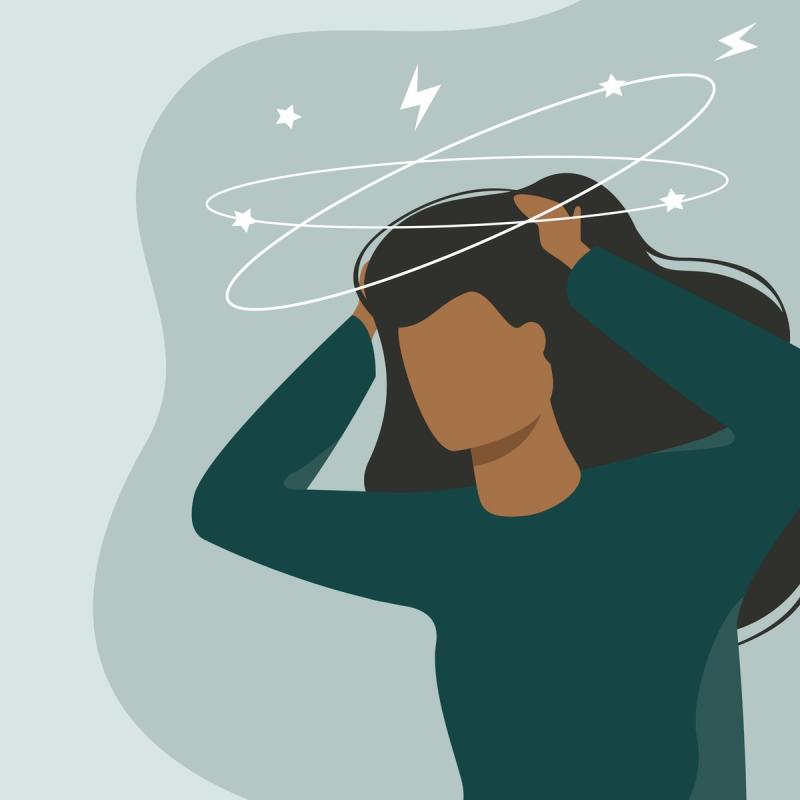Migraine headaches are the second largest cause of disability in the world. Among women, migraines are the number one cause of disability claimed.1 If you experience migraines, you understand how disruptive they can be to your life.
Key Takeaways
Migraine prevention medications are recommended when migraines are frequent or disabling. They help reduce how often migraines occur and how severe they feel.
Antidepressants like amitriptyline can be useful when migraines happen alongside mood or sleep problems.
Beta-blockers such as propranolol may reduce migraine frequency and are often chosen if you also have high blood pressure.
Anticonvulsants like topiramate are another option that can decrease migraine days and intensity.
CGRP inhibitors are a newer class of medications specifically designed to prevent migraines and may be considered when other treatments have not worked.
Types of Migraine Prevention Medications
Treatment options for migraines fall into two main groups: acute and preventative. Acute treatments are utilized as needed when a migraine occurs for relief. Preventative migraine treatment options are taken regularly, usually daily, to reduce frequency, duration, and intensity.
This comprehensive guide breaks down the different types of preventative prescription treatment options for migraines. Learn more about each class of medication, potential effectiveness, and common side effects in this article.
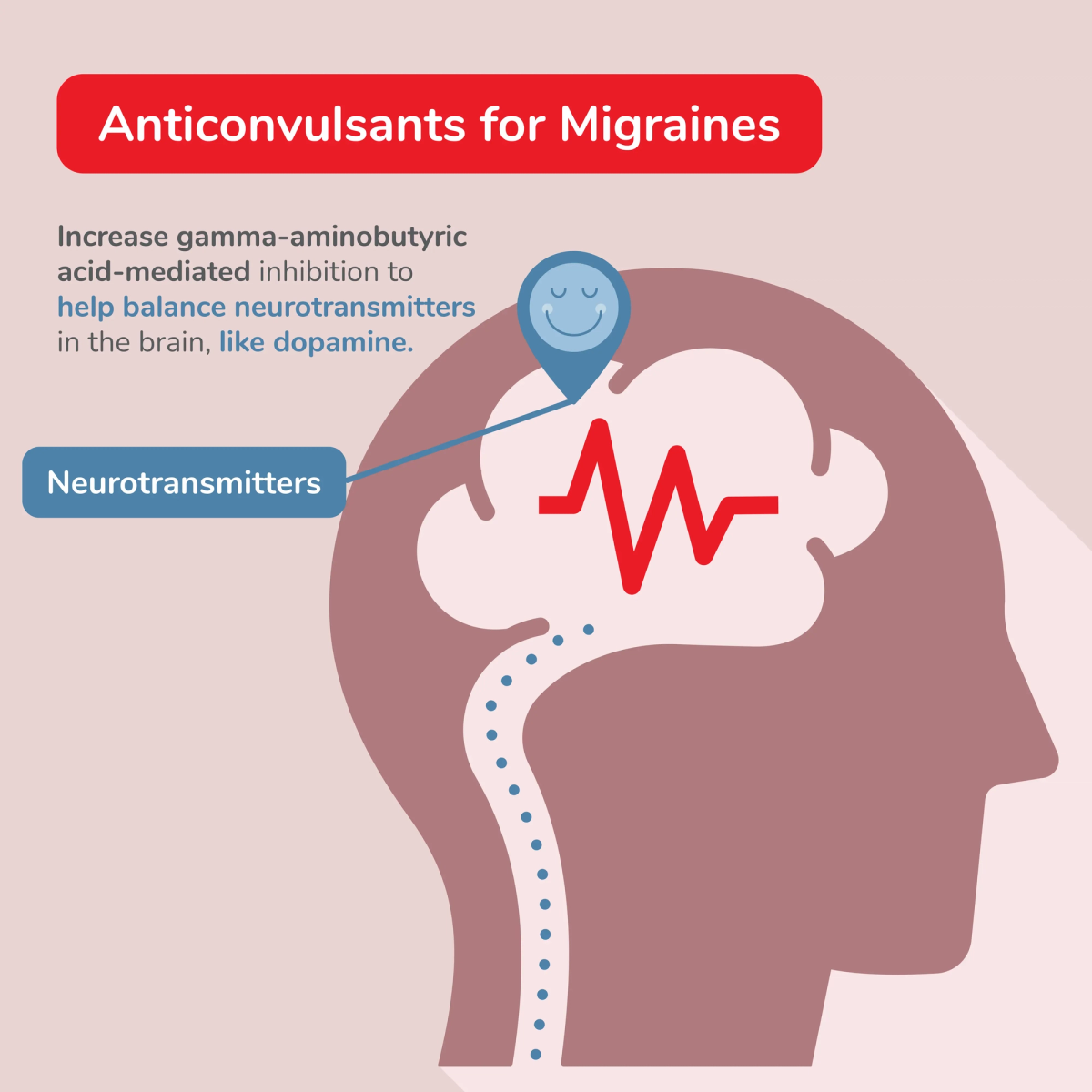
Anticonvulsants (Anti-Seizure Meds) for Migraines
Anticonvulsants, also known as anti-seizure meds, are a classification of medication primarily developed and prescribed for treating seizure conditions like epilepsy.
A common class of anticonvulsants prescribed for migraines are all processed in the body to valproic acid and can be commonly grouped together under that term. Each valproic acid similar drug is utilized by the body differently and cannot be substituted for one another. However, your medical provider may adjust your prescription to evaluate which medication is right for you.2
Although it is not completely understood how anticonvulsants reduce migraine frequency, they all increase gamma-aminobutyric acid-mediated inhibition,3 which could help balance neurotransmitters in the brain, like dopamine.
Commonly prescribed anticonvulsants for migraines include:
Divalproex-sodium (Depakote, Depakote ER®)
Topiramate (Topamax®)
Valproate (Depakene®)
Anticonvulsant Medical Research for Migraines
Of the anticonvulsants available, divalproex-sodium (generic Depakote ER®) was one of the first to be approved for the treatment of migraine and has been studied extensively. One large study showed that after 12 weeks of use of divalproex-sodium, participants experienced a 30% to 40% reduction in the frequency of migraines and over 50% had a reduction in the frequency of headaches overall.4
Because of the success of divalproex-sodium, other anticonvulsants are being studied and prescribed for migraine and headache treatment like topiramate and valproate. In one 16-week study, topiramate participants reported a significant reduction in the frequency of migraines.5 In a study of valproate, participants reported a 50% or greater reduction in migraines over one month.6
Anticonvulsant Side Effects
Valproic acid medications can carry some strong risks and potential side effects including:
Liver damage
Birth defects (when used by pregnant women)
Pancreas damage
These risks can be increased through interactions with other drugs or in users with certain conditions. Please talk with your medical provider before starting an anticonvulsant for migraine treatment.
Less severe and more common side effects include:
Drowsiness
Dizziness
Headache
Diarrhea or constipation
Changes in appetite or weight
Mood swings
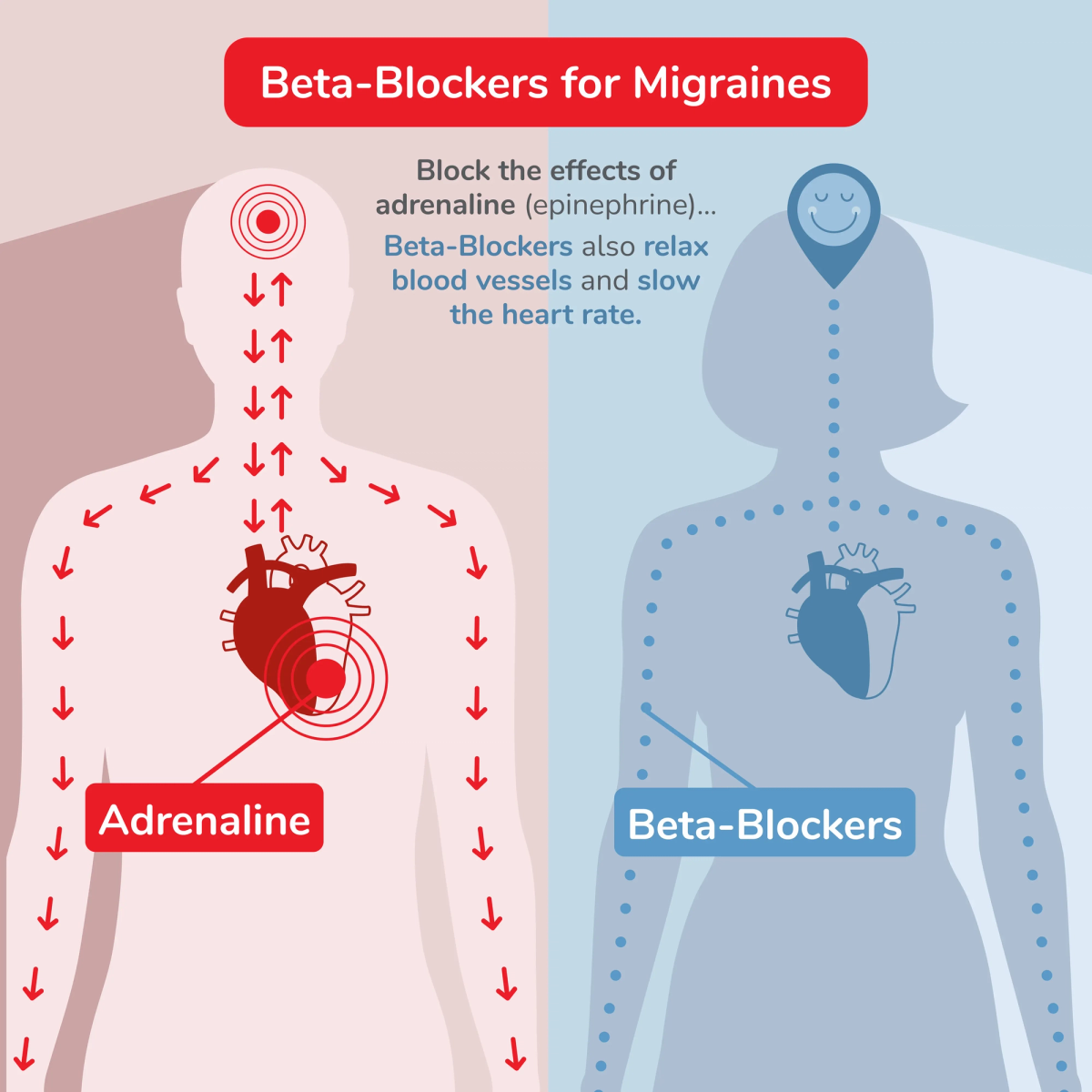
Beta-Blockers for Migraines
Beta-blockers are a group of drugs originally developed for high blood pressure that have been found effective in preventative treatment of migraines. The Academy of Neurology guideline recommends beta-blockers as the first line of therapy for the preventative treatment of migraines.7 These drugs block the effects of adrenaline (epinephrine), a hormone your body makes when stressed, excited, or scared. Beta-blockers also relax blood vessels and slow the heart rate.
It is not known exactly how beta-blockers work to prevent migraines, but experts have a few promising theories. One is that beta-blockers block a series of changes in the brain believed to trigger migraines called cortical spreading depression. Experts also theorize that beta-blockers control how blood vessels widen, affect brain chemicals like serotonin, block pain signals, and calm the nervous system. It is theorized that a combination of these functions could be involved in the prophylaxis treatment of migraines.8
Commonly prescribed beta-blockers for migraines include:
Metoprolol (Toprol XL®)
Timolol (Blocadren®)
Beta-Blocker Medical Research for Migraines
Studies have shown that when taken every day, beta-blockers can lessen future headaches by at least half. Propranolol specifically has been shown in multiple randomized controlled studies to reduce episodic migraines by 1.5 headaches per month and reduce other headaches by 50%. Participants also reported residual headaches were less severe and shorter in duration with propranolol.9
Metoprolol has been shown to reduce headache frequency by an average of one headache per month. The majority of study participants (84%) given timolol reported a reduction of 4 pain points, to zero, in their migraine headaches.10
Beta-Blocker Side Effects
Common side effects for beta-blockers include:11
Cold hands or feet
Lightheadedness
Fatigue
Low blood pressure
Erectile dysfunction
Many medical providers will not prescribe beta-blockers to people with certain conditions including heart-related conditions, asthma, lung issues, diabetes, or low blood pressure. Talk to your provider about any potential risks before taking a beta-blocker.
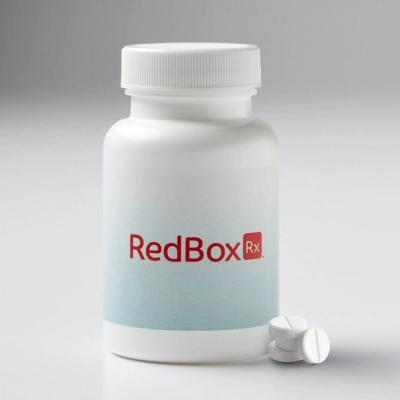
Affordable Migraine Treatment Online
Skip the doctor's office wait. Get migraine treatment online now. $25 doctor consultation.
Get Started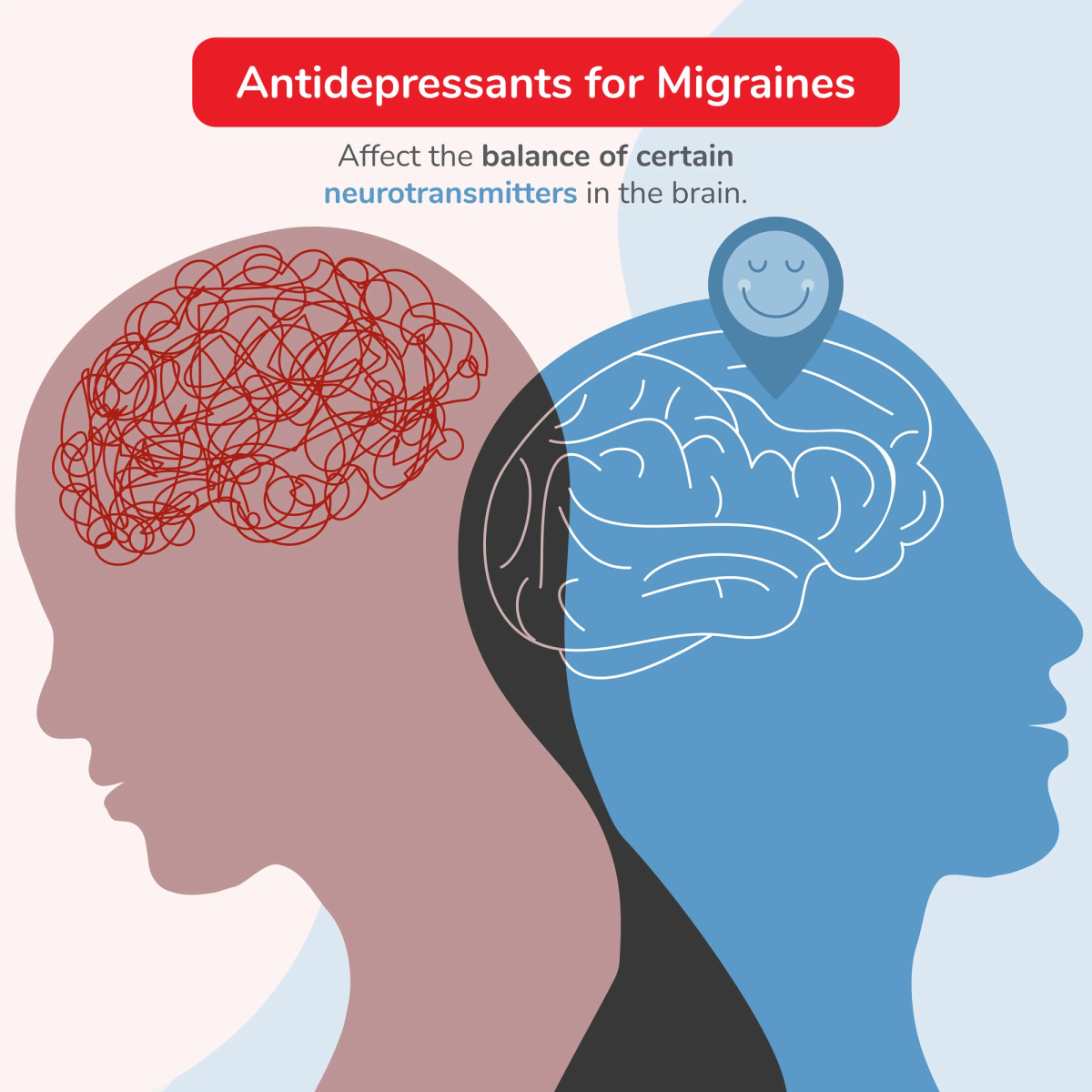
Antidepressants for Migraines
Antidepressants are a classification of medications commonly used to treat mental health conditions like depression and anxiety. They all affect the balance of certain neurotransmitters in the brain. Research has shown that some antidepressants can be effective as a preventative treatment for migraines.
Tricyclic Antidepressants (TCAs) for Migraines
Tricyclic antidepressants, sometimes called TCAs, are among the most used and studied antidepressants for migraine treatment. Amitriptyline (generic Elavil®) has a long history of use as a migraine treatment.12
It is believed that tricyclic antidepressants work by increasing serotonin in the brain, which can elevate mood and change the way nerves receive pain signals.13
Commonly prescribed tricyclic antidepressants for migraines include:
Nortriptyline (Aventyl®, Pamelor®)
Studies have shown amitriptyline is effective at both reducing the frequency and the intensity of migraines. In one study, amitriptyline significantly reduced the frequency of migraine headaches and intensity by at least 50% in participants.14 Nortriptyline performs similarly in the body but has had less research on its efficacy. It is often prescribed in place of amitriptyline if the side effects of the latter are too unpleasant for the user.15
TCA Side Effects
Common side effects of tricyclic antidepressants include:16
Drowsiness
Blurred vision
Low blood pressure
Constipation
Dry mouth
Urine retention
Serotonin and Norepinephrine Reuptake Inhibitors (SNRIs) for Migraines
Selective and norepinephrine reuptake inhibitors, also referred to as SNRIs, are a group of antidepressants that may be prescribed for preventative treatment of migraines. SNRIs show the most promise in users with both migraines and depression.17
Commonly prescribed SNRIs for migraines include:
Venlafaxine (Effexor®)
Duloxetine (Cymbalta®)
There is less research to define the efficacy of SNRIs compared to TCAs, but antidepressants are still commonly prescribed because of their milder side effects.18 SNRIs change brain chemistry and communication in the brain nerve circuitry.19
SNRI Side Effects
Common side effects of SNRIs for migraines20 include:
Nausea
Dry Mouth
Dizziness
Headache
Excessive sweating
Selective Serotonin Reuptake Inhibitors (SSRIs) for Migraines
Selective serotonin reuptake inhibitors, more commonly called SSRIs, are another group of antidepressants that may be prescribed for the preventative treatment of migraines. Like SNRIs and TCAs, SSRIs raise serotonin levels in the brain, which has been linked to changing the way the body receives pain signals.
Commonly prescribed SSRIs for migraines include:
Fluoxetine (Prozac®)
Citalopram (Celexa®)
Evidence is still sparse on the efficacy of SSRIs for migraine prevention.21
SSRI Side Effects
Common side effects of SSRIs for migraines include:22
Nausea or vomiting
Diarrhea
Headache
Dry mouth
Insomnia
Dizziness
Sexual dysfunction
Nervous or restlessness
Change in appetite
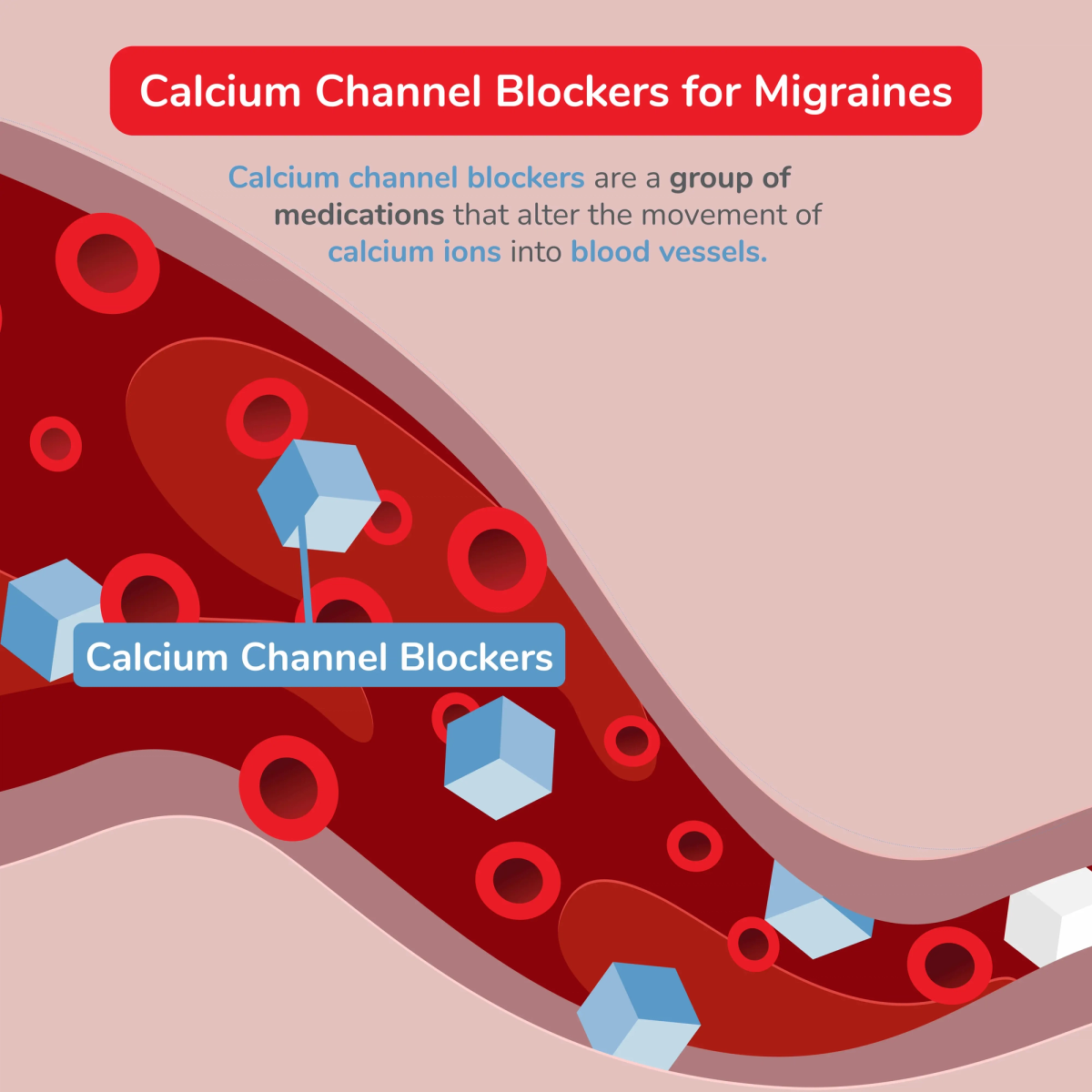
Calcium Channel Blockers for Migraines
Calcium channel blockers are a group of medications that alter the movement of calcium ions into blood vessels. Blood vessel changes have been linked to migraine headaches. The FDA hasn’t approved this group for the prevention of migraines, but a limited amount of research suggests that calcium channel blockers, like verapamil, are effective.23
Calcium channel blockers are often used as a second-line, preventative treatment option for migraine sufferers that have failed to find relief with other medications.24
Commonly prescribed calcium channel blockers for migraines include:
Diltiazem (Cardizem®, Cartia XT®, Dilacor®, Tiazac®)
Nimodipine (Nimotop®)
Verapamil (Calan®, Covera®, Isoptin®, Verelan®)
In one study review, over 40% of participants taking verapamil for migraine prevention reported a 50% or better reduction in migraine frequency.25
Calcium Channel Blocker Side Effects
Common side effects of calcium channel blockers for migraines include:26
Constipation
Dizziness
Heart palpitations
Fatigue
Headache
Flushing
Nausea
Rash
Swelling in lower legs and feet
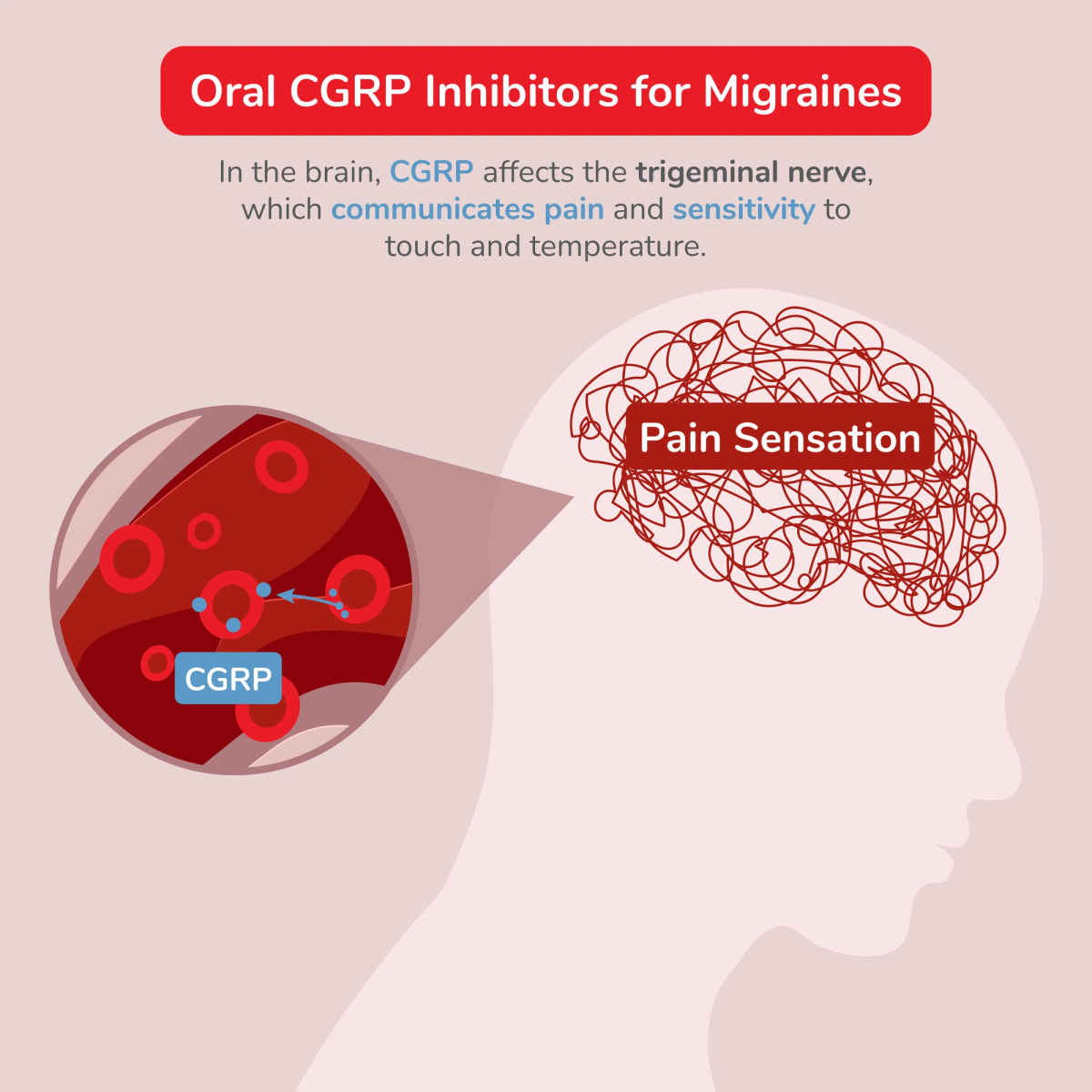
Oral CGRP Inhibitors for Migraines
CGRP inhibitors were the first class of drugs developed for the preventative treatment of migraines. Calcitonin gene-related peptide (CGRP) is involved in many body-healing processes, including inflammation. In the brain, CGRP affects the trigeminal nerve which is responsible for communicating pain and sensitivity to touch and temperature. This peptide can make headache pain worse and last longer. Migraine sufferers often have more CGRP in their blood. CGRP inhibitors block the peptide from binding to receptors in the brain.27
CGRP inhibitors come in two forms: an injection or an oral pill. Commonly prescribed oral CGRP inhibitors for migraines include:
Atogepant (Qulipta®)
Rimegepant (Nurtec®)
Data has shown that almost 88% of people studied reported fewer headache days for those with episodic migraine and 84% for those with chronic migraines while on CGRP inhibitors.28
CGRP Inhibitor Side Effects
Common side effects of CGRP inhibitors for migraines include:29
Nausea and vomiting
Back pain
Headache
Vision problems
Tingling sensations
Dry mouth
Fatigue
Joint stiffness
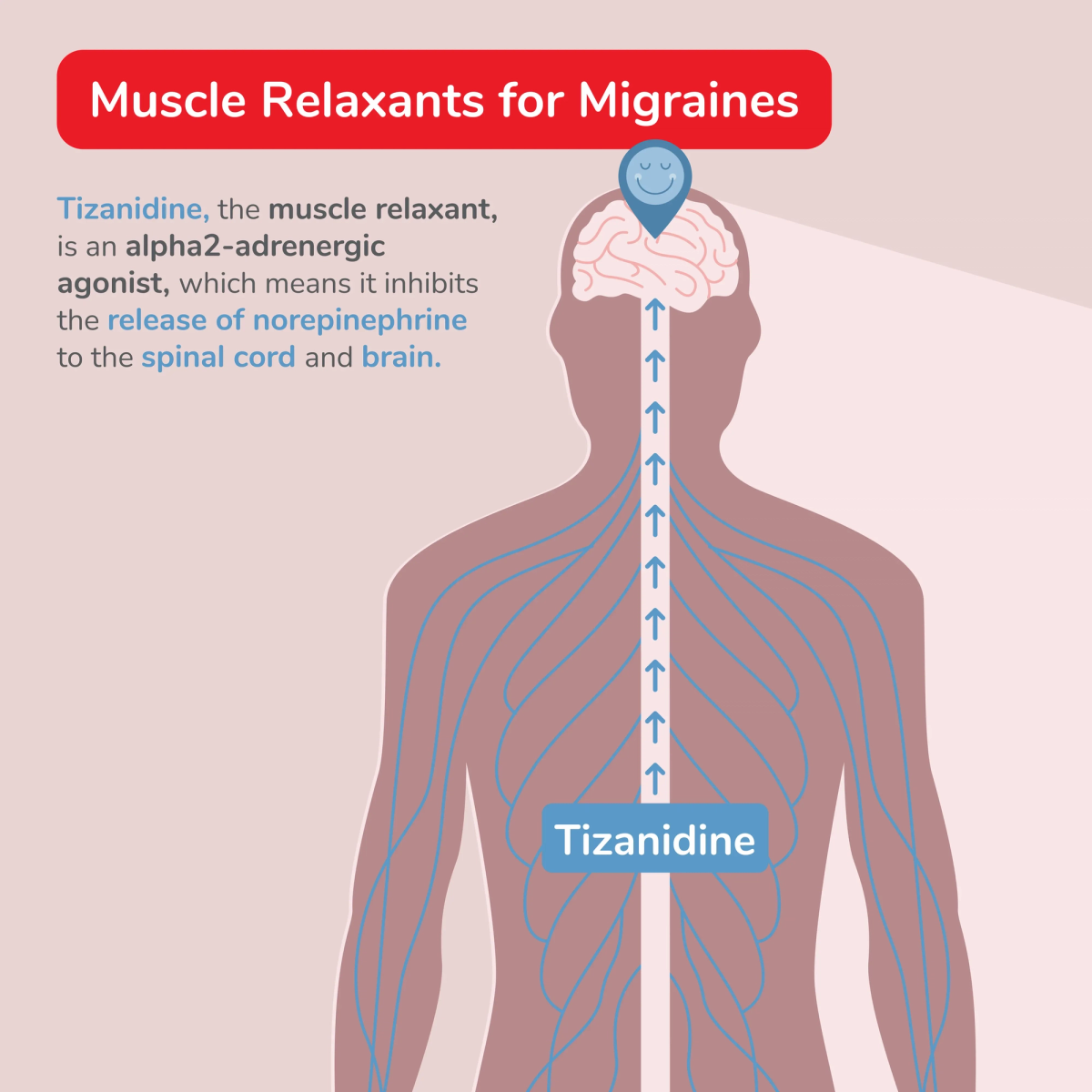
Muscle Relaxants for Migraines
Muscle relaxants are another group of medications that have shown promise in the preventative treatment of chronic daily headaches and migraines. Commonly prescribed muscle relaxants for migraines include:
Tizanidine, the muscle relaxant most studied for the treatment of headaches and migraines, is an alpha2-adrenergic agonist, which means it inhibits the release of norepinephrine to the spinal cord and brain. Norepinephrine and adrenaline regulate blood pressure and the stress response in the body.30 By blocking the intake, the nervous system and muscles can relax.31
In one double-blind study, the muscle relaxant tizanidine reduced overall headache intensity, duration, and frequency in participants. After the four-week trial, 54% of tizanidine recipients reported improvement in the headache index and 30% reported improvement in total headache days.32
Muscle Relaxant Side Effects
Common side effects of muscle relaxants for migraines include:33
Dizziness
Drowsiness
Sweating
Weakness
Depression
Vomiting
Tingling sensations
Dry mouth
Digestive and stomach issues
Migraine Prevention Medication Comparison Chart
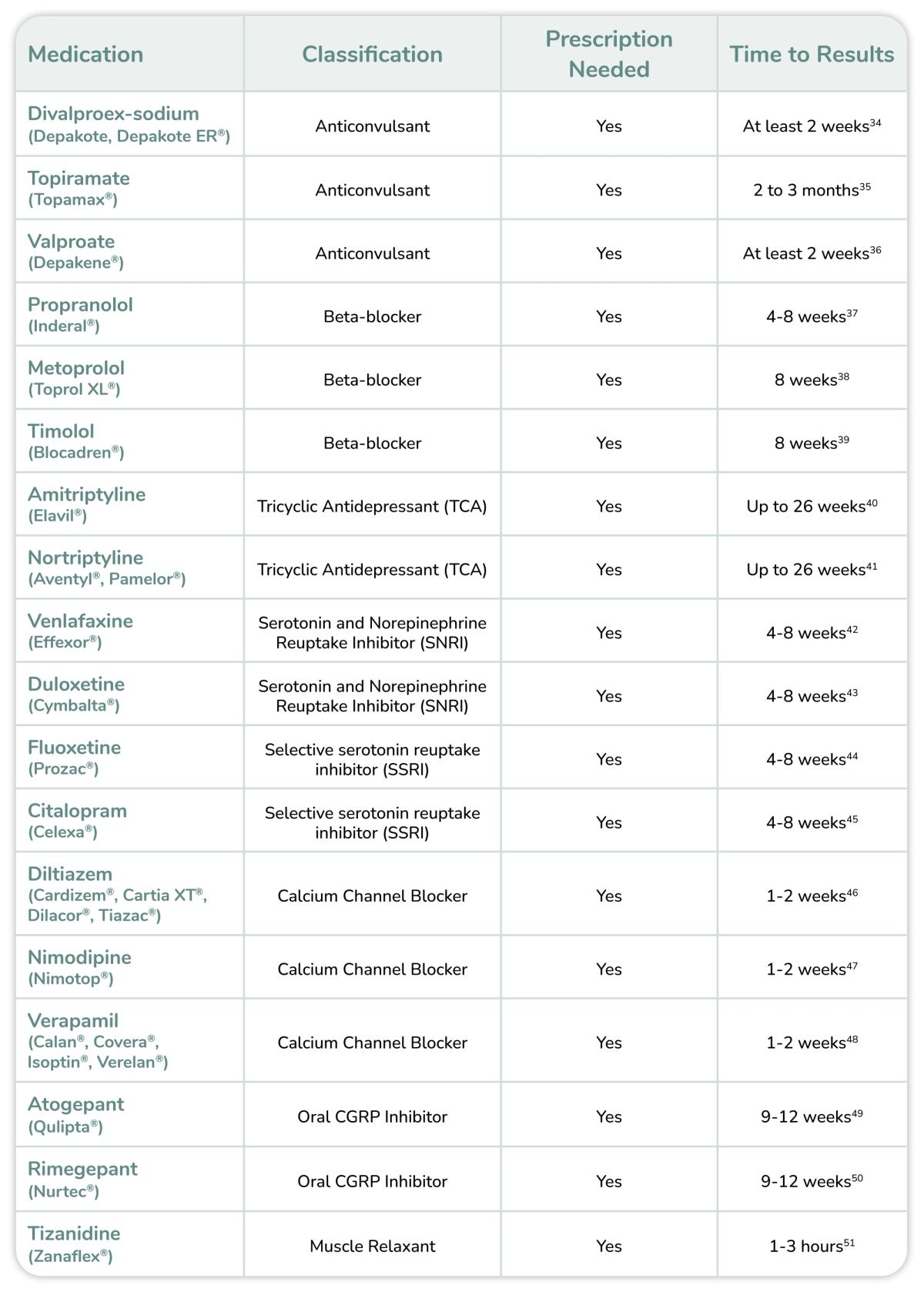
How RedBox Rx Can Help
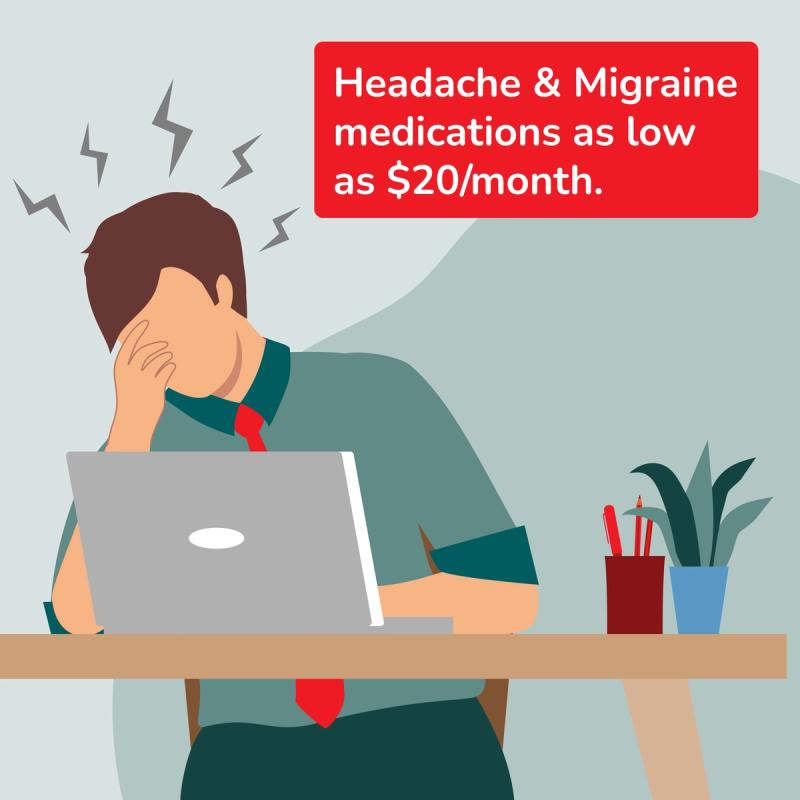
RedBox Rx makes receiving preventative treatment for headaches and migraines easy and affordable.
Benefits of RedBox Rx include:
Transparent, affordable, flat rates for medications starting at $20/month.
$25 consultation with a U.S. licensed medical professional.
No insurance required. FSA and HSA eligible.
No office wait times or scheduling issues typical with physical medical practices.
FREE shipping directly to you. Monthly and quarterly subscriptions available.
Get started on your migraine treatment journey with an online assessment.

